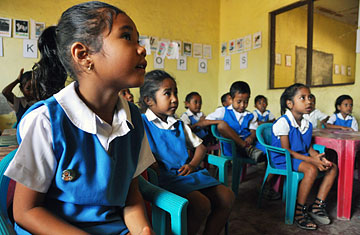
An elementary school in Manatuto, East Timor, is among just a few in the country to formally make the community's indigenous tongue the main language of instruction in early grades
With the sleeves of his button-down shirt rolled up, the man stood on an open-air stage before an audience of hundreds and read his poems with dramatic pauses, varied inflection and a sense of purpose that comes naturally to those accustomed to holding court. The man, 65-year-old Xanana Gusmão, is a former guerrilla leader and the current Prime Minister of East Timor, an island nation in Southeast Asia, which was the world's youngest country until South Sudan gained independence last year. That he was reading his poems in Portuguese, a language understood by a small fraction of the population, spoke to the close but often convoluted relationship between language, identity and politics in newly independent states.
Modern-day East Timor was claimed by Portugal in the 16th century. In 1975, no longer a global power, Portugal withdrew. Indonesia immediately invaded, claiming precolonial ownership of the island. Gusmão joined the main armed resistance group, Fretilin. A gifted orator and writer, he would become its leading voice along with José Ramos-Horta, now the President of East Timor and a Nobel Peace Prize laureate. Gusmão, Ramos-Horta and other resistance leaders were educated in Portuguese and promoted it as the language of the resistance to underline the historical and cultural differences between the island nation and Indonesia as well as to avoid infighting over which of the country's numerous indigenous languages is most emblematic of East Timorese identity.
The resistance achieved its aim in 1999, but not until Indonesia's brutal quarter-century occupation claimed some 200,000 lives and systematically devastated the social and physical foundations of the country. In 2001 an assembly elected to draft a constitution for newly independent East Timor, also known as Timor-Leste, chose Portuguese and Tetum as the official languages of the nation, to be used in parliament, schools and other public venues. Notably, the constitution and founding laws were drafted only in Portuguese. Spoken by a majority of East Timorese, Tetum had emerged as the closest thing to a national language, but the other selection, Portuguese, was controversial. Educated during the occupation, the majority of the country's youth had a much stronger grasp of Indonesian. But as the language of East Timor's recently ousted tormentors, it was viewed as toxic by the captial city of Dili's politicians.
Today many of the practical consequences of the Portuguese language's prominent status in East Timor remain troublesome. Judges speak mostly in Portuguese even though few in the courtroom — defendants and witnesses included — can understand it. Live translation often fails to prevent confusion and misunderstanding. Legislation is sometimes drafted only in Portuguese, leaving some parliamentarians unable to read a bill they are voting on.
The reality of Portuguese's limited reach in the country is most conspicuous in schools. After independence, many teachers scrambled to learn Portuguese so they could follow the rules, though Tetum and other indigenous languages are often used de facto. "Almost all of the teachers here have a problem with the Portuguese language, [but] Portuguese is what's mandated," says the principal of Colegio San Miguel, a primary school in Dili. Joao Marsao, who at 58 is older than most of his fellow teachers and learned Portuguese when the European country still ruled, says many of his colleagues approach him with basic questions about how to talk with their students in Portuguese.
It is against this backdrop that a group of education-policy officials is advocating for reforms that would sanction the use of local languages in primary schools. They say international expertise is on their side. UNESCO has for years asserted that children best develop cognitive skills — and, eventually, learn to speak, read and write in multiple languages — by being taught in their early years in their household language. The group also posits that instructing children in their indigenous language promotes social equality by giving regular students — unlikely to have had private lessons in a nonhousehold language — an equal opportunity to participate in class.
